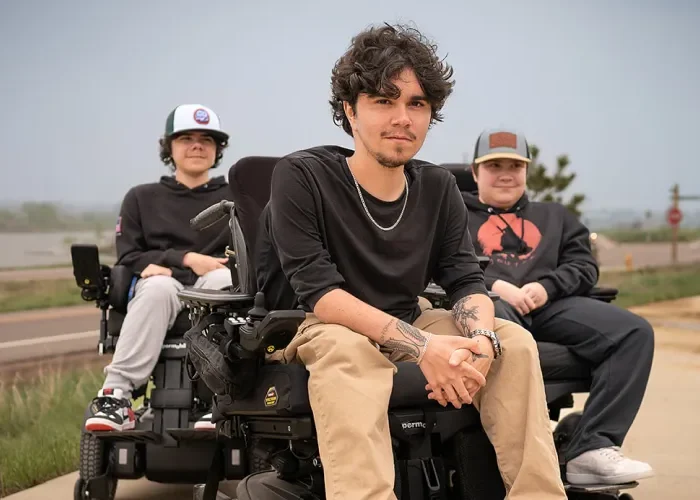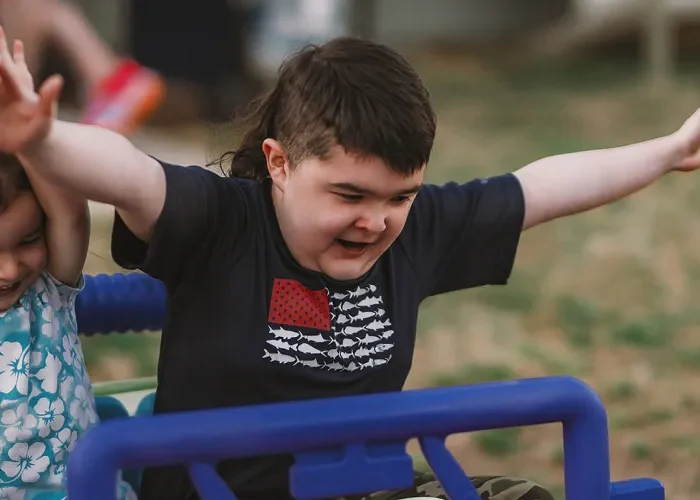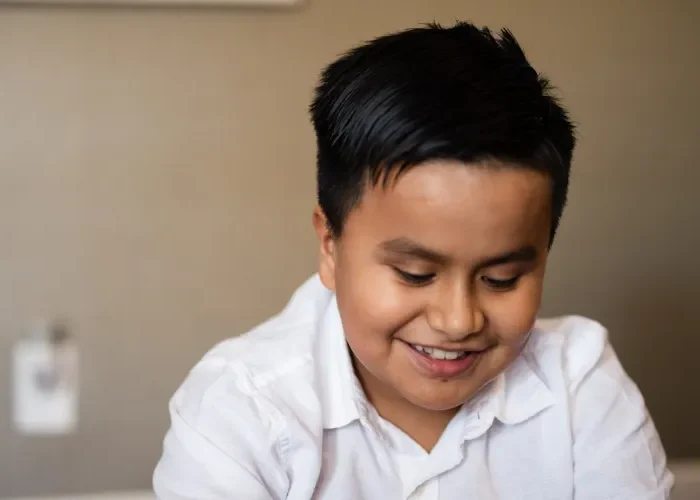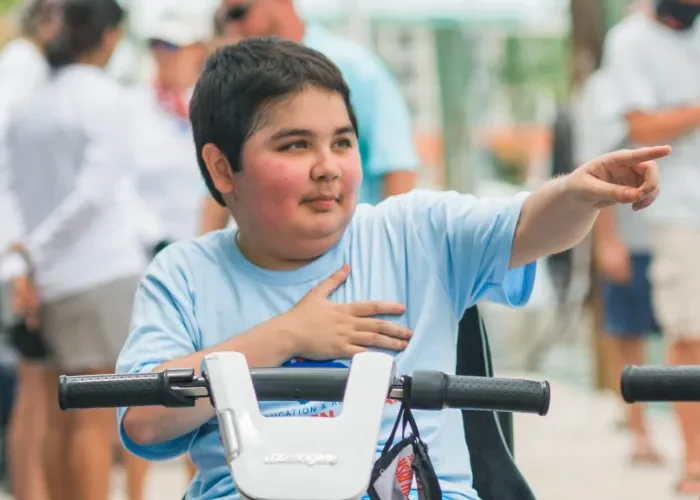Jamie Romito folds down the aluminum ramp from the back of the silver van parked in the driveway. With the bottom laying flush on the ground, her youngest son, Kaleb, wheels his power wheelchair up the ramp and into the van. With small, deft moves of his right hand, he maneuvers the chair’s joystick to park himself in just the right spot, and Jamie straps him in.
For the longer version of this video, click here.
Next comes Dominic, or Dom, as his friends and family refer to him. He proceeds up the ramp and finds a place behind Kaleb. Jamie again, uses the gray, locking straps to secure her son. Finally, Collin drives his chair up next to Dom and parks side-by-side with him. Jamie secures him and then folds the ramp back up through the rear doors. She and Richard get in the front two seats, and now the entire Romito family is ready to hit the road.
Dom, Collin, and Kaleb are three brothers who all live with Duchenne muscular dystrophy (Duchenne), a severe, degenerative muscle disorder that causes irreversible muscle loss and impaired motor function—starting with the extremities and then progressing to more critical organs such as the heart and lungs. For the Romitos, having three of their four children (all boys) living with the disease has forever changed the way they move through the world—individually and collectively.
For the three affected brothers it has fostered a unique bond, a shared understanding and a book of lessons handed down from one brother to the next. Dom is the oldest and faced many Duchenne-related obstacles first. “To me he has always been an old soul,” says Richard. “He’s the spiritual one. Very understanding; easy to talk to; laid back. He understands everything. Nothing bothers him.”
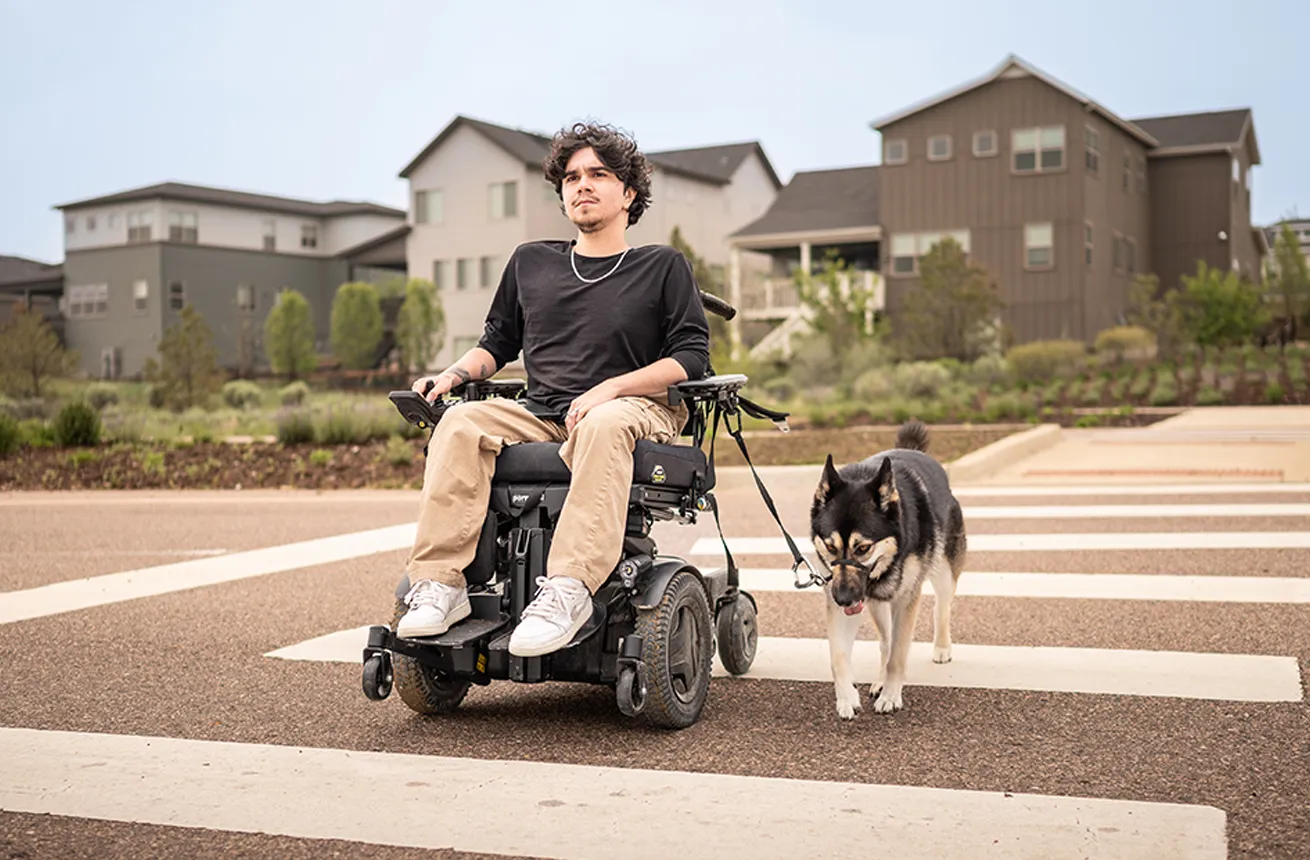
“It’s just a part of myself, of who I am,” says Dom. “It’s like now, I don’t look at it like a limitation. I understand things are more difficult. It’s something that’s developed to a point where it is, and I wouldn’t change it for anything. It made me the person who I am.”
Dom exudes confidence and calm as he speaks. The 22-year-old tries to model an imperfect example for his younger brothers as they strive toward adulthood. His love for life is strong despite the tinge of stoicism evident as he stares out the window at the vast plains and distant peaks of the Rocky Mountains. He has lived in Colorado for most of his life, although he and his older brother, Nicholas, were both born in Louisiana, where his parents are from.
It was there Jamie and Richard first met, got married, and started a family. Richard worked as a firefighter and then transferred to the police department, while Jamie trained as a nurse. When Hurricane Katrina hit New Orleans in 2005, Richard was deployed to assist in search and rescue efforts. Hurricane Rita followed just a few weeks later, so they decided to move the family to Colorado.
“When we moved, we noticed that Dominic, at four, was having trouble climbing stairs,” Jamie recalls. “He was playing t-ball and we noticed he was running a lot slower than the other kids.” Being an RN, she had some understanding that Dom was not meeting all of his physical developmental milestones, but didn’t imagine that a genetic disease would be the cause. A neurologist in Louisiana had told them that he would eventually catch up.
However, in 2006, their first neurologist visit in Colorado was met with a radical change in tune. “The doctor said he knew by the way Dominic walked into the office what he had,” says Richard. Blood tests revealed that Dom’s creatine kinase levels were “off the chart,” a sure sign of muscle cell breakdown related to muscular dystrophy. Subsequent blood tests confirmed that he had Duchenne. “They told us there’s no cure. You need to take him home and love him,” says Richard.
The coming weeks were a hazy mix of emotions and information gathering. Jamie remembered learning about muscular dystrophy in nursing school, but very minimally, so unfortunately, she had to turn to the internet to find answers to most of her questions. As most Duchenne families learn, this does not alleviate anxiety. Jamie and Richard found better resources after they turned to patient advocacy organizations, and other families, via social media.
Jamie and Richard’s apprehensions were not without merit. In addition to Dominic, baby Collin was less than a year old, and they were pregnant again with another boy. The x-linked disorder is passed to boys, while women carry the recessive gene. “The doctors informed us there was a 50% chance our other boys can have it too,” says Jamie. “It was mortifying. We were just really scared. We waited a while to get their blood work. We didn’t want to know. It was enough dealing with Dominic’s diagnosis.”
After Kaleb was born, Jamie and Richard got both him and Collin tested. “That was another bombshell,” says Richard. “Not one, but now three.”
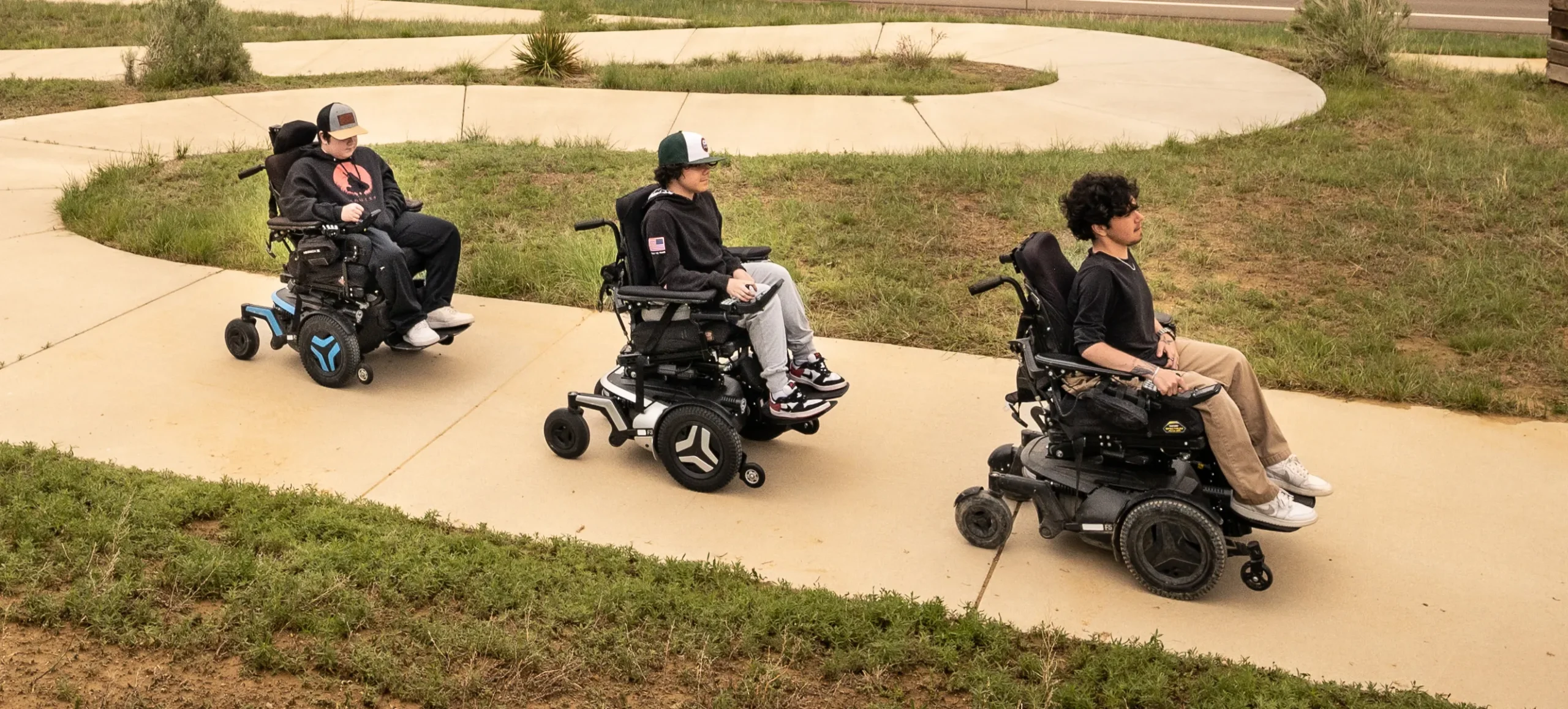
Amidst the pain and shock of that moment, a transformation began taking place in the Romito family. New to their community, north of Denver, the Romito family began networking with local and national organizations to help them support their sons. In the process, a new calling emerged.
“That’s when I started thinking about starting a nonprofit,” recalls Richard. “We started going to conferences and meeting other families. And one of the biggest takeaways was quality of life and the meaning of camp—the sense of belonging for these kids and their families. And that’s how the Romito Foundation started.”
By transforming grief into an unstoppable drive, Richard has worked tirelessly for over a decade to keep the Foundation up and running. “I’m either full-throttle or horizontal,” he quips. His work has built a successful organization that currently serves about 40 families living in Colorado with Duchenne. “I saw the need and how important it was to come together as a community.” The Romito Foundation specializes in organizing fun outings for individuals living with Duchenne as well as support for caregivers and other members of the family. “As much as we are trying for a treatment and wanting a cure, what we can focus on now is providing a better quality of life,” he continues. “The bigger thing now is to help the families in our community here in Colorado. To really help give the boys a sense of belonging. Over the years, we found out how important that community has been to us, the parents.”
In 2014, Dom, in middle school at the time, started having real trouble with stairs and their house was two stories. By 2015, Dom was using a wheelchair full time—a transition his younger brothers would soon go through as well. Collin and Kaleb also stopped walking in their middle school years, and struggled with both the physical implications as well as the social ones. “When I first started to stop walking, I didn’t like the way people looked at me,” says Collin. “I got a little sad and upset.” The lifelong sports fan wanted badly to be included in activities with his friends, but he had reached a point where he was not physically able to do so.
Dom had faced a similar predicament in high school, and had taken matters into his own hands. He made his case to the football coach and became the Team Manager. “That really helped me through high school—built some friendships. It made me feel part of something bigger than myself.” His confidence inspired Collin to do the same, who now manages the varsity football team. It is integral to Collin’s happiness these days, and inspires him to think about a future in sports. The high school sophomore has dreams of working for a sports organization as he gets older, either managing or doing commentary for the games.
“I think it’s been good for the younger ones to look up to Dominic and ask questions about things they are going to lose the ability to do later,” explains Jamie. “They all have the same thing. They understand each other.” She and Richard admit that the three boys have a connection so strong that even they feel left out sometimes.
Compared to Dom, Collin and Kaleb are both shy, quiet with strangers, and generally soft-spoken, although around the right crowd they will light up. When a competitive gesture is made, neither can resist, whether around the table playing cards with family, or matching skills playing video games on their home console.
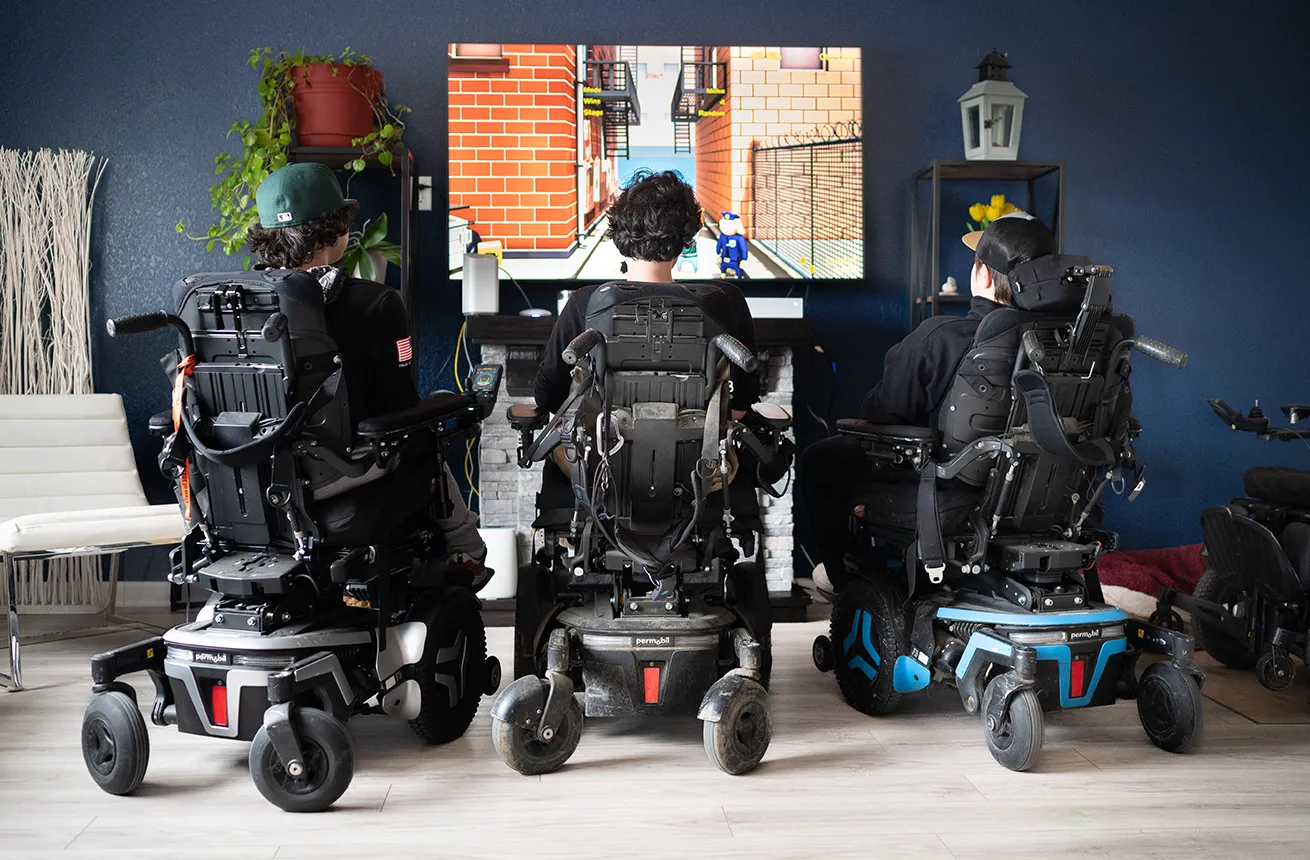
“Collin usually beats me at Xbox,” claims Dom. The three brothers love to game together, where they get to face off, or play on the same team against other friends from the broader Duchenne community—brilliant gamers themselves. “The Xbox is a blessing and a curse,” explains Richard. “It’s a curse because they want to be on it all the time. The blessing is they’re still able to communicate with their other Duchenne friends. They don’t have other after-school activities.”
“I really appreciate how my mom has supported me,” says Kaleb, opening up a bit. As the youngest, he really just wants to match or better his brother’s accomplishments and get through school, which has been a challenge at times. “He likes music,” adds Richard. “We may catch him singing. If we call him out on it, he’ll get embarrassed.” During the pandemic, Kaleb started attending school online and now continues classes at home.
For Richard and Jamie, the inherent challenges of raising three boys with Duchenne has taught them important lessons about how to improve the quality of everyone’s lives in the situation. “I feel like it’s a continual grieving process because you grieve all the losses—the things they used to be able to do that they can’t do now,” says Jamie. At the same time, she and Richard counter the grief with compassionate pragmatism and an incredible drive to provide the best experiences for their boys and others with Duchenne in their community.
At the same time, they have learned that taking care of themselves is an equally important task. “I try to get to the gym, to eat healthy,” shares Jamie. Their work at the Romito Foundation is also aimed at alleviating the stress that managing Duchenne causes, often multiplying to unhealthy levels, pushing relationships to the breaking point. Richard and Jamie have found ways to support each other by sharing the caregiving workload, and giving each other space to deal with grief in their own way, daily. These lessons have been integrated into the Foundation’s work as well. “We’ve been credited with saving at least two marriages,” says Richard.
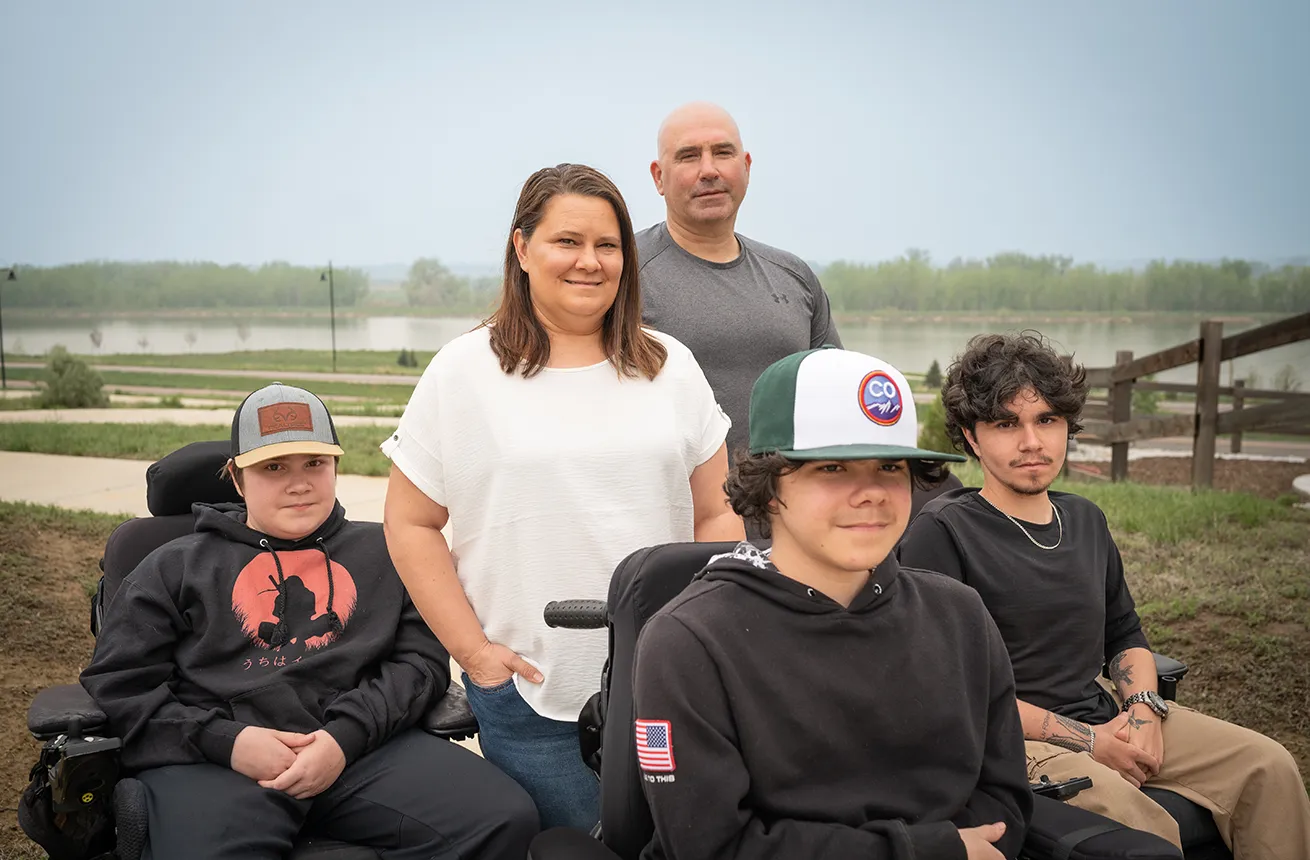
Nicholas, the eldest and unaffected child of Jamie and Richard (not pictured), also remains a huge part of his brothers’ lives even though he lives on his own now. Whether it’s taking them out fishing or for a night on the town, he prioritizes spending time with them. Recently, he took Dom on a trip to Louisiana to enjoy cajun food together, managing all of Dom’s needs for travel and lodging himself—a big responsibility.
Finding fun and traveling as a family have also been a crucial part of the puzzle—finding joy in the broader world. Getting a van that could fit all three power wheelchairs was no small expense, but has allowed the family to move around together. While flying can be stressful, driving their van is a much lower-stakes activity. The boys enjoy getting some fresh air by the lake near their house for the afternoon. “We want people to see the positive,” says Richard. “We want to live in the positive now. We laugh more than we cry.” Focusing on optimism, doing fun things together, and exploring the world against all obstacles, has given the Romitos a sense of momentum that has uplifted them against the odds. “The words I can’t or I won’t are not in our vocabulary,” says Richard. “If the boys want to do it, or if we want to do it, we’ll do our best to make it happen. We don’t say no. We try to live life to the fullest. There is no I can’t. Yes, it’s a lot of work, but it’s not their fault.”
